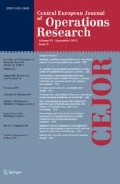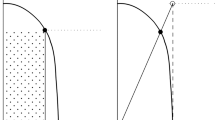Abstract
The shortest path games are considered in this paper. The transportation of a good in a network has costs and benefits. The problem is to divide the profit of the transportation among the players. Fragnelli et al. (Math Methods Oper Res 52: 251–264, 2000) introduce the class of shortest path games and show it coincides with the class of monotone games. They also give a characterization of the Shapley value on this class of games. In this paper we consider further five characterizations of the Shapley value (Hart and Mas-Colell’s in Econometrica 57:589–614, 1989; Shapley’s in Contributions to the theory of games II, annals of mathematics studies, vol 28. Princeton University Press, Princeton, pp 307–317, 1953; Young’s in Int J Game Theory 14:65–72, 1985, Chun’s in Games Econ Behav 45:119–130, 1989; van den Brink’s in Int J Game Theory 30:309–319, 2001 axiomatizations), and conclude that all the mentioned axiomatizations are valid for the shortest path games. Fragnelli et al. (Math Methods Oper Res 52:251–264, 2000)’s axioms are based on the graph behind the problem, in this paper we do not consider graph specific axioms, we take \(TU\) axioms only, that is we consider all shortest path problems and we take the viewpoint of an abstract decision maker who focuses rather on the abstract problem than on the concrete situations.

Similar content being viewed by others
Notes
The fixed isomorphism is the following: we take an arbitrary complete ordering on \(N\), therefore \(N = \{1,\ldots ,| N |\}\), and for all \(v \in \mathcal G ^N\): let \(v = (v(\{1\}),\ldots ,v(\{| N |\}), v(\{1,2\}),\ldots ,v(\{| N | -1 , | N |\}),\ldots ,v(N)) \in \mathbb R ^{2^{| N |} -1}\).
References
Chun Y (1989) A new axiomatization fo the Shapley value. Games Econ Behav 45:119–130
Dubey P (1975) On the uniqueness of the Shapley value. Int J Game Theory 4:131–139
Dubey P (1982) The Shapley value as aircraft landing fees-revisited. Manag Sci 28:869–874
Einy E (1988) The Shapley value on some lattices of monotonic games. Math Soc Sci 15:1–10
Fragnelli V, García-Jurado I, Méndez-Naya L (2000) On shorthest path games. Math Methods Oper Res 52:251–264
Hart S, Mas-Colell A (1989) Potential, value, and consistency. Econometrica 57:589–614
Márkus J, Pintér M, Radványi A (2011) The Shapley value for airport and irrigation games. http://mpra.ub.uni-muenchen.de/30031
Myerson RB (1977) Graphs and cooperation in games. Math Oper Res 2:225–229
Peleg B, Sudhölter P (2003) Introduction to the theory of cooperative games. Kluwer, Dordrecht
Pintér M (2012) Every hierarchy of beliefs is a type. http://arxiv.org/abs/0805.4007. arXiv0805.4007v3
Shapley LS (1953) A value for \(n\)-person games. In: Kuhn HW, Tucker AW (eds) Contributions to the theory of games II, annals of mathematics studies, vol 28. Princeton University Press, Princeton, pp 307–317
van den Brink R (2001) An axiomatization of the Shapley value using a fairness property. Int J Game Theory 30:309–319
van den Brink R (2007) Null or nullifying players: the difference between the Shapley value and the equal division solutions. J Econ Theory 136:767–775
Young HP (1985) Monotonic solutions of cooperative games. Int J Game Theory 14:65–72
Author information
Authors and Affiliations
Corresponding author
Additional information
Miklós Pintér acknowledges the support by the János Bolyai Research Scholarship of the Hungarian Academy of Sciences and grant OTKA. Anna Radványi thanks the Hungarian Academy of Sciences for the financial support under the Monumentum Programme (LD-004/2010).
Rights and permissions
About this article
Cite this article
Pintér, M., Radványi, A. The Shapley value for shortest path games: a non-graph-based approach. Cent Eur J Oper Res 21, 769–781 (2013). https://doi.org/10.1007/s10100-012-0272-5
Published:
Issue Date:
DOI: https://doi.org/10.1007/s10100-012-0272-5




